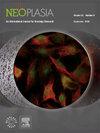Astrocytes upregulate survival genes in tumor cells and induce protection from chemotherapy.
IF 7.7
2区 医学
Q1 ONCOLOGY
引用次数: 239
Abstract
In the United States, more than 40% of cancer patients develop brain metastasis. The median survival for untreated patients is 1 to 2 months, which may be extended to 6 months with conventional radiotherapy and chemotherapy. The growth and survival of metastasis depend on the interaction of tumor cells with host factors in the organ microenvironment. Brain metastases are surrounded and infiltrated by activated astrocytes and are highly resistant to chemotherapy. We report here that coculture of human breast cancer cells or lung cancer cells with murine astrocytes (but not murine fibroblasts) led to the up-regulation of survival genes, including GSTA5, BCL2L1, and TWIST1, in the tumor cells. The degree of up-regulation directly correlated with increased resistance to all tested chemotherapeutic agents. We further show that the up-regulation of the survival genes and consequent resistance are dependent on the direct contact between the astrocytes and tumor cells through gap junctions and are therefore transient. Knocking down these genes with specific small interfering RNA rendered the tumor cells sensitive to chemotherapeutic agents. These data clearly demonstrate that host cells in the microenvironment influence the biologic behavior of tumor cells and reinforce the contention that the organ microenvironment must be taken into consideration during the design of therapy.星形胶质细胞上调肿瘤细胞中的生存基因并诱导对化疗的保护。
在美国,超过40%的癌症患者会发生脑转移。未治疗患者的中位生存期为1 ~ 2个月,常规放化疗可延长至6个月。肿瘤细胞在器官微环境中与宿主因子的相互作用决定了肿瘤细胞的生长和转移存活。脑转移瘤被活化的星形胶质细胞包围和浸润,对化疗具有高度耐药性。我们在这里报道了人乳腺癌细胞或肺癌细胞与小鼠星形胶质细胞(而不是小鼠成纤维细胞)共培养导致肿瘤细胞中生存基因(包括GSTA5, BCL2L1和TWIST1)的上调。上调的程度与对所有化疗药物的耐药性增加直接相关。我们进一步表明,生存基因的上调和随之而来的抗性依赖于星形胶质细胞和肿瘤细胞之间通过间隙连接的直接接触,因此是短暂的。用特定的小干扰RNA敲除这些基因使肿瘤细胞对化疗药物敏感。这些数据清楚地表明,微环境中的宿主细胞影响肿瘤细胞的生物学行为,并加强了在设计治疗时必须考虑器官微环境的论点。
本文章由计算机程序翻译,如有差异,请以英文原文为准。
求助全文
约1分钟内获得全文
求助全文
来源期刊

Neoplasia
ONCOLOGY-
自引率
2.10%
发文量
82
期刊介绍:
Neoplasia publishes the results of novel investigations in all areas of oncology research. The title Neoplasia was chosen to convey the journal’s breadth, which encompasses the traditional disciplines of cancer research as well as emerging fields and interdisciplinary investigations. Neoplasia is interested in studies describing new molecular and genetic findings relating to the neoplastic phenotype and in laboratory and clinical studies demonstrating creative applications of advances in the basic sciences to risk assessment, prognostic indications, detection, diagnosis, and treatment. In addition to regular Research Reports, Neoplasia also publishes Reviews and Meeting Reports. Neoplasia is committed to ensuring a thorough, fair, and rapid review and publication schedule to further its mission of serving both the scientific and clinical communities by disseminating important data and ideas in cancer research.
 求助内容:
求助内容: 应助结果提醒方式:
应助结果提醒方式:


